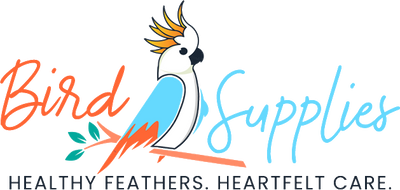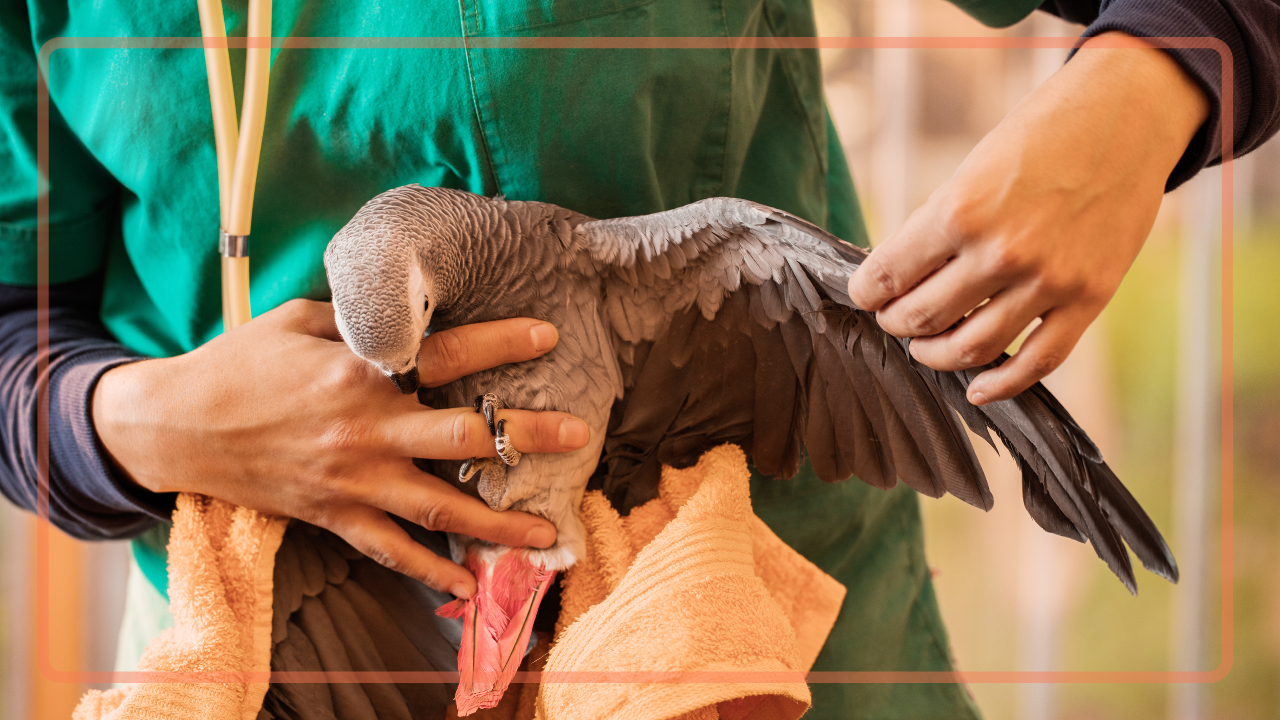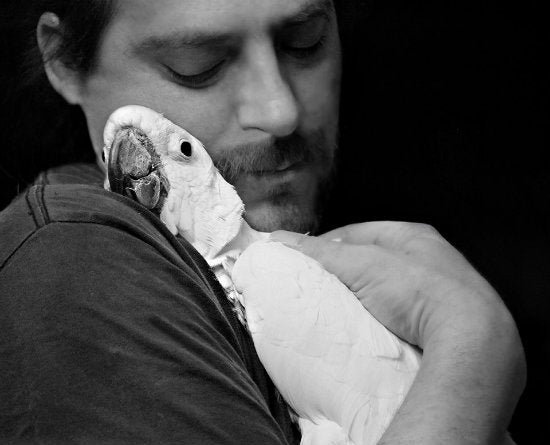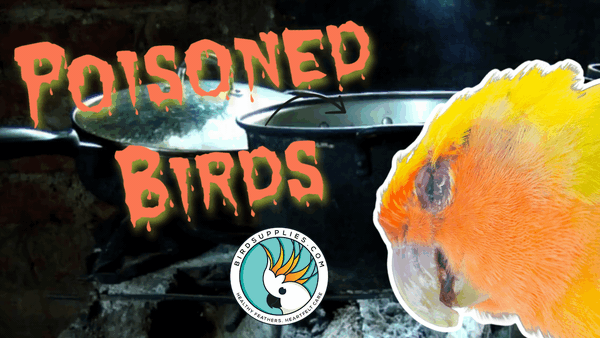Table of Contents
Revised: 02/12/2024
Attention bird lovers! Did you know that pet birds, like parrots, are especially sensitive to household dangers due to their small size and unique physiology? For one thing, they have extremely efficient respiratory systems which makes them especially sensitive to fumes that humans can't even smell!
To keep your feathered friends safe, it's essential to be prepared for emergencies with a First Aid Book and Bird First Aid Kit.
But, moreover, learning about common household hazards for birds, you can take proactive steps to prevent accidents and create a safer environment for your beloved pets. Let's work together to ensure the well-being of our feathered companions! Here are 10 common household dangers that can endanger your feathered friend.
1) Poisoning
Parrots can be inadvertently poisoned in the home through various means:
-
Toxic Foods: Many common human foods, such as chocolate, avocado, caffeine, and alcohol, can be toxic to parrots if ingested.
-
Household Plants: Certain indoor plants, like philodendrons, poinsettias, and lilies, contain toxins that are harmful to parrots if nibbled on or ingested.
-
Chemicals: Household cleaners, pesticides, insecticides, and even fumes from non-stick cookware can contain harmful chemicals that can poison parrots through inhalation or ingestion. Never use aerosol sprays around your bird.
-
Lead and Zinc: Parrots are particularly susceptible to lead and zinc poisoning, which can occur through chewing on or ingesting items like foreign made bird toys, lead-based paint, curtain weights, or zinc-coated hardware.
-
Medications: Human medications, including over-the-counter and prescription drugs, can be toxic to parrots if ingested accidentally.
-
Tobacco Smoke: Secondhand smoke from cigarettes, cigars, marijuana, or pipes can be harmful to parrots and may lead to respiratory problems or even poisoning.
It's crucial for parrot owners to be aware of these potential hazards and take steps to prevent accidental poisoning by ensuring a safe environment for their birds. Regular veterinary check-ups can also help detect any signs of poisoning early on.
| Aluminum cooking bags Automatic dishwasher detergent Avocado Bleach Carpet freshener Cigarettes and cigarette smoke Cleaning solutions Coffee grounds Chocolate candies Epoxy glue Essential oils Ethylene glycol (antifreeze, film) Flea collars and sprays Furniture polish Homemade play dough (toxic levels of salt) Leather protecting sprays |
Linoleum (contains lead) Matches Mothballs Medicines (both prescription and over the counter) Oven cleaners Personal care products Pesticide strips, sprays,foggers Pine oil cleaners Plant spikes and all fertilizer Plug-in air fresheners Potpourri oils Poisonous plants (inside and outside) Spray starch Tea tree oil (Melaleuca) Teflon cooking pans Thermometers (contain mercury) |
2) Non Stick Coatings (when overheated
Fumes, particularly those from Teflon and aerosol sprays, can pose serious risks to the health of parrots.
Teflon (PTFE) Fumes:

- Teflon-coated cookware, such as non-stick pans, releases toxic fumes when overheated. These fumes contain polytetrafluoroethylene (PTFE), which can be lethal to parrots even in small amounts.
- Exposure to Teflon fumes can cause a condition known as "Teflon Toxicosis," leading to respiratory distress, labored breathing, and even death within a short period.
- It's crucial to avoid overheating Teflon-coated cookware around parrots. If any overheating occurs, immediately remove the bird from the area to fresh air and seek veterinary assistance.
Aerosol Sprays:
It's best to avoid using aerosol sprays in areas where parrots are present. Instead, opt for alternative products or methods of application that do not produce airborne particles or fumes.
How do you help a bird with respiratory problems?
In the event of inhalation of these substances, it's imperative to respond swiftly and calmly, as it constitutes a medical emergency for your beloved bird but you don't want to stress your bird out so that it breaths more rapidly.
The first step is to gently remove your bird from the area of exposure and prioritize fresh air circulation by promptly opening windows or doors.
Next, put your bird in a hospital cage and closely monitor your bird for any signs of respiratory distress, which may include:
- Rapid or difficult breathing may include noticeable tail movements
- Wheezing or coughing
- Open-mouthed breathing
- Abnormal sounds during breathing
- Discharge from the nostrils
- Unusual lethargy or weakness
If you observe any of these symptoms, it's crucial to take immediate action by contacting an avian or exotic veterinarian. Inform them that your bird is experiencing respiratory distress and follow their guidance closely.
To find a qualified avian or exotic veterinarian in your area, you can visit reputable websites such as:
Remember, your quick and informed response can make a significant difference in the well-being and recovery of your feathered companion. Stay calm, act decisively, and prioritize your bird's health above all else.
3) Open Water
Toilets often serve as the primary source of open water in households. Many of us enjoy placing our pet birds on shower perches in the morning for a refreshing bath and some quality bonding time. However, it's crucial not to overlook the importance of keeping the toilet lid down to prevent potential accidents.
Additionally, it's essential to remain vigilant of other water hazards within the home, such as sinks, bathtubs, buckets, and even your dog or cat's water bowls. Hot pots of water left unattended on stoves can also pose a significant risk to the safety of pet birds, as they may accidentally fall into the scalding liquid.
By being mindful of these potential dangers and taking proactive measures to mitigate risks, we can ensure a safe and nurturing environment for our cherished feathered companions.
4) Unhealthy Foods
When it comes to feeding our feathered buddies, we've got to pay close attention to what goes into their bowls. Some foods can be downright dangerous, while others might slowly cause health issues down the road.
Avoid these foods:
- avocado
- chocolate
- caffeine
- alcohol
- onions and garlic
- steer clear of salty, fatty, and highly processed foods
- fruit pits and apple seeds
- xylitol
But it's not just the obvious stuff we need to watch out for. Relying on seeds for your bird's meals can lead to trouble, too. Sure, seeds are easily available and many pet stores "push" them. But, eating too many seeds can leave your feathered friend missing out on important stuff like vitamins, minerals, and proteins. That's not good—it could lead to your bird feeling weak or getting sick over time.
So, how do we keep our little tweethearts happy and healthy? Variety is key! Mix it up with some fresh fruits, veggies, grains, and top-notch bird pellets. By serving up a buffet of good eats, you're making sure your bird gets all the goodies it needs to stay chirpy and cheery for years to come.
5) Electrical Cords
Exploring birds have a knack for investigating their surroundings with their beaks, but sometimes their curiosity can lead to dangerous encounters with electrical cords and outlets. It might seem puzzling, but for some reason, birds find chewing on cords or poking around in uncovered outlets intriguing. However, the consequences can be dire.
Electrical burns pose a significant threat to our feathered friends, often resulting in severe injuries or even fatalities. Imagine the pain of a nasty burn in their throat, which can take months to heal, provided the bird survives the ordeal.
To keep our avian companions safe, it's essential to take preventive measures. Concealing electrical cords as much as possible is a crucial step. Consider hiding them within ordinary PVC pipes to prevent access. Additionally, covering all outlets with child safety devices can prevent birds from exploring where they shouldn't.
If you're using electrical devices like bird heaters or lights, ensure that the cords are safely concealed to prevent any mishaps. Once again, utilizing common PVC plumbing pipe can be a simple yet effective solution to safeguard your bird and your home from potential hazards.
By taking these precautions, we can create a safer environment for our beloved birds, allowing them to explore without putting themselves in harm's way. Let's prioritize their safety and well-being as responsible bird owners.
6) Bird Toys
Ensuring the safety and well-being of our feathered friends is paramount, especially when it comes to selecting toys and accessories for them to enjoy. While it's tempting to opt for cheaper options or trendy finds, it's essential to prioritize quality and safety above all else.
When it comes to purchasing toys for your parrot, it's crucial to be mindful of potential hazards, especially with toys manufactured overseas. Chinese-made toys, in particular, have been known to contain dangerous parts or materials that can pose risks to our birds. As a rule of thumb, if you can't pronounce the name of the manufacturer, it's best to steer clear.
Even with toys from reputable brands, it's essential to inspect them thoroughly to ensure they're safe for your bird. Strong beaks can break certain plastics into small parts that may be swallowed, leading to choking or digestive blockage. Additionally, there have been instances of small toy parts getting stuck in a bird's beak, causing distress and potential injury.
To mitigate these risks, stick with trusted bird toy manufacturers like Super Bird Creations, Planet Pleasures, and others known for their commitment to safety and quality. These companies prioritize using bird-safe materials and designs that minimize the likelihood of accidents.
Another critical consideration when choosing toys is selecting the appropriate size for your bird's species. While it may be tempting to opt for a smaller version of a toy to save money, it's not worth the risk. Inappropriately sized toys can lead to choking, injuries, or even fatalities, so it's crucial to invest in toys that are suitable for your bird's size and strength.
Furthermore, rope toys, while enjoyable for birds, require regular inspection due to their tendency to fray over time. Birds love to pick and preen at the strings, but if the rope becomes frayed enough to form long strands, it can pose a serious danger. These frays can tangle around your bird's toes or neck, leading to injury or strangulation.
7) Ceiling Fans
Ceiling fans pose a serious danger when unclipped birds fly into them. Being animals of prey, birds are inclined to feel a little anxious about moving objects above them and many birds find a ceiling fan to be stressful. After all, hawks fly over wild birds in the hunt. Make sure that your pet bird is well supervised when your ceiling fan is on.

8) Windows, Doors, and Mirrors
It's important to be mindful of the risks posed to our feathered companions when they encounter windows, mirrors, or doors. Birds, when frightened, may instinctively fly towards sources of light to escape potential threats. Unfortunately, this can lead to collisions with solid surfaces, such as windows or mirrors, resulting in concussions or even broken necks.
To mitigate this risk, consider keeping your bird's wings clipped, which can help prevent them from flying into hazardous areas. Additionally, be cautious of interior doors, as birds may perch on them and risk injury when the door is closed. By being vigilant and taking preventive measures, we can create a safer environment for our beloved birds to thrive in.
9) Other Pets
While birds often live happily with other family pets, you should always be careful when your bird is around them. Even though you may think it is very cute for your bird to cuddle up to a dog or cat, the fluttering motion of birds attracts the prey instinct in cats, ferrets and dogs and the bacteria in a bite or scratch can be fatal to you bird with
It's heartwarming to see our feathered friends coexisting harmoniously with other pets in the household. However, it's essential to approach these interactions with caution. While it may seem adorable for your bird to cuddle up with a dog or cat, it's crucial to recognize the potential risks involved.
The fluttering motion of birds can trigger the prey instinct in certain pets, such as cats, ferrets, and dogs. This instinctive response may lead to unintended consequences, such as bites or scratches, which can pose serious health risks to your bird.

What many may not realize is that even a seemingly minor bite or scratch from another pet can introduce deadly bacteria into your bird's system. These bacteria can swiftly lead to infection, causing severe illness or even death in a matter of hours.
This problem is more prevalent than one might think. Many pet owners have experienced the devastating consequences of a seemingly harmless interaction between their bird and another household pet.
Therefore, it's crucial to always supervise interactions between your bird and other pets closely. Additionally, consider taking preventive measures, such as keeping your bird in a separate area or ensuring that interactions are supervised and controlled.
in hours.
10) Air Quality
It's crucial to recognize the risks of poor air quality for our bird companions, whether from wildfires, pollution, or chemical spills. These environmental factors can release harmful particles and gases, irritating birds' respiratory systems and posing health hazards like respiratory distress and weakened immune systems.
Unfortunately, such hazards are on the rise, threatening bird populations globally. To protect our birds, monitor air quality regularly, limit outdoor exposure during high-risk periods, and improve indoor air quality with measures like air purifiers.
Additionally, in the event of an evacuation due to environmental hazards, consider placing a wet towel over the bird carrier to help filter out pollutants and provide temporary relief from poor air quality. By staying informed and proactive, we can safeguard our feathered friends from the dangers of polluted air.
In conclusion, it is important to bird proof your home, have a bird first aid kit and first aid book, and have a clean hospital cage available at all times to prevent deadly household dangers that can kill parrots.
Related Posts:
How To Tell If Your Bird Has Been Poisoned
How To Help A Bird With Respiratory Problems
D-R-O-P Approach To Bird Burns
How To Make a Parrot Hospital Cage
References:
Household Hazards for Pet Birds - Merck Veterinary Manual
10 Everyday Items That Are Toxic to Birds
Burkett, G. Avian First Aid: Be Your Birds First Responder DVD.
Household Hazards and Dangers to Birds
Rach, J. First Aid for Birds. Howell Book House; New York, NY, 1998.
Diane Burroughs, LCSW is a licensed psychotherapist trained in ABA therapy techniques. She specializes in avian anxiety disorders and is certified in Nutrition For Mental Health. Diane has written a number of bird behavior books and she offers behavior consultations. She's developed a range of UnRuffledRx Science-backed Parrot Wellness Supplies.
Diane's products have been featured in the Journal of Avian Medicine and Surgery and at Exoticscon, a conference for exotic pet veterinarians. Her bird collars & supplements are stocked in avian vet clinics and bird stores throughout the US. With over 30 years in the field of behavior, Diane has created thousands of successful individualized behavior plans that help pets thrive.
TAGS: #BirdSafety #HouseholdHazardsForBird #BirdCare
SHARING IS CARING! PLEASE SHARE ON YOUR FAVORITE SOCIAL MEDIA NOW!




